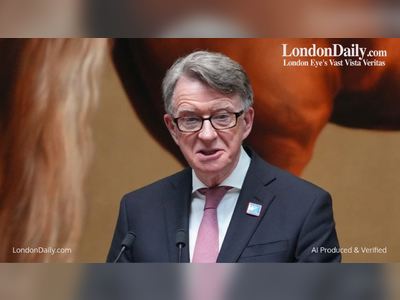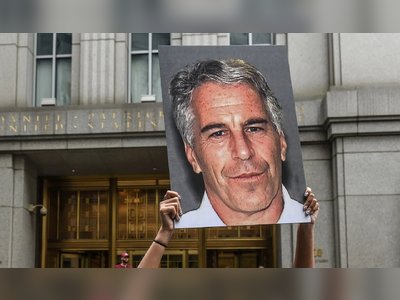
The Moral Cost of Choosing Stability Over Justice
The events of January 6 illustrate the flaw in accommodating extremists in the name of stability.
When Nancy Pelosi was asked “Why bother?” with Donald Trump’s second impeachment trial, given that he was no longer president, the speaker of the House replied: “You cannot go forward until you have justice.”
It was a simple but powerful statement that Americans understand in a personal and visceral way after the January 6 insurrection on Capitol Hill. Trump may have been acquitted, but accountability is still being pursued through the trials of the Capitol rioters, and 69 percent of Americans view those prosecutions as “very important.”
Pejorative comparisons have been made to other countries, in disbelief or in jest—one analyst has even questioned whether the Republicans are turning into Lebanon’s Hezbollah: “a political party that also has an armed wing to coerce other political actors through violence.” But as Americans pause to survey the damage and worry about the continued erosion of democratic norms domestically, they should also take a moment to understand what lessons the events of January 6 offer for America abroad.
What did the previously unimaginable experience of watching an attempted coup unfold in Washington, D.C., bring to Americans’ understanding of the fragility of democracy anywhere and, crucially, the quest for accountability everywhere? If America cannot go forward until there is justice, can other countries? Bypassing accountability in the name of “moving on” will not succeed—should not succeed—in the United States, in much the same way that making compromises overseas in the name of stability has failed to deliver either justice or stability.
Progressives in the U.S. often warn about American overreach and imperialism, advocating humility overseas as they hold up a mirror to their country to highlight its failings. They view the U.S. from the outside to understand what living on the receiving end of American power looks like. This can be a welcome change from the bombastic Republican “You’re either with us or against us” approach; U.S. efforts to export democracy while running roughshod through the Middle East; or the rudderless Trumpian maximum-pressure campaign against Iran.
But when American progressives advocate empathy for those who have grievances against the U.S., they look not only at people living under the thumb of American-backed autocrats, such as Egypt’s Abdel Fattah al-Sisi, but also at anti-American rulers or groups, such as Hezbollah, Syrian President Bashar al-Assad, or Iran. Progressives see such anti-American forces abroad as aggrieved but also as more representative of their respective societies, because they are not funded, or supported, by Washington. A serious problem arises when progressives counsel engagement or power-sharing agreements with such players while overlooking the violence or abuse they mete out.
Sitting in Beirut, one could argue that Trumpism and MAGA represent the real America. But would Democrats advocate working with the Proud Boys, or offer them a seat at the table, for the sake of unity? If not, then why should the Lebanese who oppose Hezbollah, the Syrians who oppose Assad, or the Afghans who oppose the Taliban be expected to compromise or share power, rather than being afforded the same standards of justice and accountability Americans today are demanding?
Secretary of State Antony Blinken has acknowledged that the United States’ ability to speak out about democracy and human rights had taken a hit as a result of the attempted coup, but insisted that America could still set an example because of its willingness to openly confront its own imperfections and challenges. Indeed, President Joe Biden’s inauguration was solemn and reassuring. As many as 280 people from the mob that stormed the Capitol have been arrested and face charges including sedition. Though the impeachment trial did not end with a conviction, the proceedings, broadcast live for the world to see, were a powerful statement and, as the Financial Times wrote, “restored some of the republic’s good name.”
In his inaugural speech, Biden called for unity, but did not elaborate (and largely stayed quiet on Trump’s impeachment). Most Republicans argued that the best way to unite the country was to swiftly move on, whereas Democrats demanded investigations and trials—in other words, accountability and consequences.
How does that pursuit of accountability apply overseas?
Take my country, Lebanon, which has imploded over the past 18 months in a financial and economic crisis. The national currency has collapsed, food prices have risen rapidly (in some cases by 400 percent), and almost half the population now lives in poverty, up from a quarter just a year ago. All of this has been compounded by the pandemic and the horrific blast at Beirut’s port in August. The country has been without a government since the cabinet resigned in the aftermath of that explosion. There has been no serious investigation or pursuit of justice.
Protests that started in October 2019 broke through a barrier of fear and took aim at Hezbollah for the first time because the group has become such an entrenched part of the corrupt establishment that is sinking Lebanon, its tentacles seemingly everywhere. The blast then unleashed the public’s ire against the group—some reports suggest that the explosive materials stored at the port were tied to Hezbollah and the Assad regime.
Other political parties in Lebanon are guilty of corruption, willful negligence, and abuse of power (and have also escaped accountability and consequences). But none is as powerful as Hezbollah, which is still listed as a terrorist organization by the U.S. State Department; none has sent its fighters to Syria, Iraq, and Yemen; and none stands accused today of using violence to silence its domestic opponents. Hezbollah has denied any role in the killing last month of Lokman Slim, a secular Shia intellectual and virulent critic of the party who had been threatened repeatedly—yet its supporters gloated after Slim’s death. Even if no one from the party pulled the trigger, it certainly created the permissive environment in which such killings are possible.
It’s unlikely that anyone will ever be brought to justice in this case, or a litany of others, however, because here in Lebanon, impunity reigns. The 12 politicians and journalists killed in the past 16 years were all in the anti-Hezbollah camp. The International Court of Justice charged several Hezbollah operatives in absentia with plotting the 2005 assassination of Lebanon’s former Prime Minister Rafik Hariri, and one was found guilty last summer, but the party’s leader, Hassan Nasrallah, warned anyone against touching the men.
In its latest report on Lebanon, the International Crisis Group, a nonpartisan, Brussels-based organization, nevertheless recommended that the international community and the Lebanese themselves avoid “renewing a contest over Hizbollah’s role in Lebanon,” which it said “would risk polarising its politics in dangerous ways and likely make urgently needed reforms impossible.” In other words, unity, not accountability. Except for a footnote about Hariri’s killing, there was no mention of the series of assassinations. Last month, ICG President Robert Malley was named Biden’s special envoy for Iran. Under normal circumstances, a nongovernmental recommendation of that sort would be of limited import, but in effect, the Biden administration now includes a senior national-security official who headed an organization that advocated against accountability in my country.
Hezbollah is part of Lebanese society, and some of the group’s members are elected to Parliament, but easing polarization does not mean unity at all costs, ignoring injustices and crimes. This is why, amid talk of unity and coexistence with Trump voters, those who rioted on January 6 are facing charges and will stand trial, and Republican Representative Marjorie Taylor Greene, an ardent Trump supporter who has voiced backing for violence against Democrats, was stripped of her committee assignments and may even face expulsion from Congress.
In dealing with heads of states or regimes in the anti-American camp, the Democrats’ approach can also be concerning. In 2007, Pelosi traveled to Damascus to meet with Assad, who had been subjected to sanctions and ostracized by the Bush administration for his regime’s alleged role in Hariri’s assassination. Syrian troops still occupied Lebanon at the time of the killing and were guilty of egregious abuses. Syria itself remained a dictatorship. But Pelosi dismissed George W. Bush’s criticism of her trip and, alongside her Democratic colleagues, insisted that increasing dialogue with Syria on issues such as Hezbollah, the insurgency in Iraq, and peace with Israel was a way to improve stability in the region.
Engagement is necessary in diplomacy, but engagement without pressure or concessions undermines the foundation of stability. Pursuing stability without justice achieves neither—the 10-year civil war in Syria is a devastating testament to that.
Conversely, in the aftermath of the killing of the Saudi journalist Jamal Khashoggi in October 2018, Pelosi was adamant that accountability must be sought. “If we decide commercial interests override the statements we make and the actions we take,” she said, “then we must admit we have lost all moral authority.” Both Republicans and Democrats pushed the Trump administration to hold Crown Prince Mohammed bin Salman accountable, standards that Pelosi did not apply to Assad.
Washington’s allies and partners should be held to higher standards than autocrats the U.S. doesn’t support, but accountability must apply to both. The Biden administration has now released a declassified report on the Khashoggi murder and imposed sanctions and a travel ban on Saudi officials. Although the report named the crown prince, no sanctions were imposed on him—the need for stability prevailed. Riyadh remains an important partner in the Middle East and the Biden administration needs to keep the Saudis close as it engages Iran. But if full accountability is not attainable, can injustices ever be redeemed?
American values and American interests will never fully align, and the U.S. will always be accused of hypocrisy as it upholds human rights. But after the events of January 6, Americans must, more than ever, understand that unearned forgiveness and a lack of accountability can perpetuate the rot in the system, erode norms, and undermine long-term stability and governance, at home and abroad.
“Democracy is not our default state of being,” Democratic Senator Richard Blumenthal said after Trump’s acquittal. “Democracy survives only so long as the institutions that support it thrive.” Can you build and maintain democracies, or encourage budding democratic systems, when injustices are papered over and accountability is forgotten?
Democracy is a lofty goal, and a loaded word in the Middle East, after the Bush administration’s “freedom agenda.” But accountability is a worthy quest that can enable the building of institutions, judicial systems, and functioning governments, and pave the way to better governance and rule of law. Crucially, it’s not an American value that needs to be exported—it is a basic demand of citizens who are pursuing it already, in the Middle East and elsewhere.
Accountability may appear divisive, but in some ways, that is the point. “It is intended to enforce a clear division between those who accept and are committed to democracy and those who are willing to turn to violence when the vote doesn’t turn out the way that they want it to,” Henry Farrell, a politics professor at Johns Hopkins University, wrote after the Capitol insurrection.
In countries that are not democracies, the division is between those who are fighting for human rights, the rule of law, and transparency, and those who have a monopoly on power and violence, which allows them to evade accountability. This is not to say that the U.S. can or should go around the world administering accountability, or that it should stop engaging with its foes. But it also shouldn’t smother accountability, or favor stability over justice. The events of January 6 should remind Americans that although accountability is divisive, without it, there is no justice and no governance—anywhere.
It was a simple but powerful statement that Americans understand in a personal and visceral way after the January 6 insurrection on Capitol Hill. Trump may have been acquitted, but accountability is still being pursued through the trials of the Capitol rioters, and 69 percent of Americans view those prosecutions as “very important.”
Pejorative comparisons have been made to other countries, in disbelief or in jest—one analyst has even questioned whether the Republicans are turning into Lebanon’s Hezbollah: “a political party that also has an armed wing to coerce other political actors through violence.” But as Americans pause to survey the damage and worry about the continued erosion of democratic norms domestically, they should also take a moment to understand what lessons the events of January 6 offer for America abroad.
What did the previously unimaginable experience of watching an attempted coup unfold in Washington, D.C., bring to Americans’ understanding of the fragility of democracy anywhere and, crucially, the quest for accountability everywhere? If America cannot go forward until there is justice, can other countries? Bypassing accountability in the name of “moving on” will not succeed—should not succeed—in the United States, in much the same way that making compromises overseas in the name of stability has failed to deliver either justice or stability.
Progressives in the U.S. often warn about American overreach and imperialism, advocating humility overseas as they hold up a mirror to their country to highlight its failings. They view the U.S. from the outside to understand what living on the receiving end of American power looks like. This can be a welcome change from the bombastic Republican “You’re either with us or against us” approach; U.S. efforts to export democracy while running roughshod through the Middle East; or the rudderless Trumpian maximum-pressure campaign against Iran.
But when American progressives advocate empathy for those who have grievances against the U.S., they look not only at people living under the thumb of American-backed autocrats, such as Egypt’s Abdel Fattah al-Sisi, but also at anti-American rulers or groups, such as Hezbollah, Syrian President Bashar al-Assad, or Iran. Progressives see such anti-American forces abroad as aggrieved but also as more representative of their respective societies, because they are not funded, or supported, by Washington. A serious problem arises when progressives counsel engagement or power-sharing agreements with such players while overlooking the violence or abuse they mete out.
Sitting in Beirut, one could argue that Trumpism and MAGA represent the real America. But would Democrats advocate working with the Proud Boys, or offer them a seat at the table, for the sake of unity? If not, then why should the Lebanese who oppose Hezbollah, the Syrians who oppose Assad, or the Afghans who oppose the Taliban be expected to compromise or share power, rather than being afforded the same standards of justice and accountability Americans today are demanding?
Secretary of State Antony Blinken has acknowledged that the United States’ ability to speak out about democracy and human rights had taken a hit as a result of the attempted coup, but insisted that America could still set an example because of its willingness to openly confront its own imperfections and challenges. Indeed, President Joe Biden’s inauguration was solemn and reassuring. As many as 280 people from the mob that stormed the Capitol have been arrested and face charges including sedition. Though the impeachment trial did not end with a conviction, the proceedings, broadcast live for the world to see, were a powerful statement and, as the Financial Times wrote, “restored some of the republic’s good name.”
In his inaugural speech, Biden called for unity, but did not elaborate (and largely stayed quiet on Trump’s impeachment). Most Republicans argued that the best way to unite the country was to swiftly move on, whereas Democrats demanded investigations and trials—in other words, accountability and consequences.
How does that pursuit of accountability apply overseas?
Take my country, Lebanon, which has imploded over the past 18 months in a financial and economic crisis. The national currency has collapsed, food prices have risen rapidly (in some cases by 400 percent), and almost half the population now lives in poverty, up from a quarter just a year ago. All of this has been compounded by the pandemic and the horrific blast at Beirut’s port in August. The country has been without a government since the cabinet resigned in the aftermath of that explosion. There has been no serious investigation or pursuit of justice.
Protests that started in October 2019 broke through a barrier of fear and took aim at Hezbollah for the first time because the group has become such an entrenched part of the corrupt establishment that is sinking Lebanon, its tentacles seemingly everywhere. The blast then unleashed the public’s ire against the group—some reports suggest that the explosive materials stored at the port were tied to Hezbollah and the Assad regime.
Other political parties in Lebanon are guilty of corruption, willful negligence, and abuse of power (and have also escaped accountability and consequences). But none is as powerful as Hezbollah, which is still listed as a terrorist organization by the U.S. State Department; none has sent its fighters to Syria, Iraq, and Yemen; and none stands accused today of using violence to silence its domestic opponents. Hezbollah has denied any role in the killing last month of Lokman Slim, a secular Shia intellectual and virulent critic of the party who had been threatened repeatedly—yet its supporters gloated after Slim’s death. Even if no one from the party pulled the trigger, it certainly created the permissive environment in which such killings are possible.
It’s unlikely that anyone will ever be brought to justice in this case, or a litany of others, however, because here in Lebanon, impunity reigns. The 12 politicians and journalists killed in the past 16 years were all in the anti-Hezbollah camp. The International Court of Justice charged several Hezbollah operatives in absentia with plotting the 2005 assassination of Lebanon’s former Prime Minister Rafik Hariri, and one was found guilty last summer, but the party’s leader, Hassan Nasrallah, warned anyone against touching the men.
In its latest report on Lebanon, the International Crisis Group, a nonpartisan, Brussels-based organization, nevertheless recommended that the international community and the Lebanese themselves avoid “renewing a contest over Hizbollah’s role in Lebanon,” which it said “would risk polarising its politics in dangerous ways and likely make urgently needed reforms impossible.” In other words, unity, not accountability. Except for a footnote about Hariri’s killing, there was no mention of the series of assassinations. Last month, ICG President Robert Malley was named Biden’s special envoy for Iran. Under normal circumstances, a nongovernmental recommendation of that sort would be of limited import, but in effect, the Biden administration now includes a senior national-security official who headed an organization that advocated against accountability in my country.
Hezbollah is part of Lebanese society, and some of the group’s members are elected to Parliament, but easing polarization does not mean unity at all costs, ignoring injustices and crimes. This is why, amid talk of unity and coexistence with Trump voters, those who rioted on January 6 are facing charges and will stand trial, and Republican Representative Marjorie Taylor Greene, an ardent Trump supporter who has voiced backing for violence against Democrats, was stripped of her committee assignments and may even face expulsion from Congress.
In dealing with heads of states or regimes in the anti-American camp, the Democrats’ approach can also be concerning. In 2007, Pelosi traveled to Damascus to meet with Assad, who had been subjected to sanctions and ostracized by the Bush administration for his regime’s alleged role in Hariri’s assassination. Syrian troops still occupied Lebanon at the time of the killing and were guilty of egregious abuses. Syria itself remained a dictatorship. But Pelosi dismissed George W. Bush’s criticism of her trip and, alongside her Democratic colleagues, insisted that increasing dialogue with Syria on issues such as Hezbollah, the insurgency in Iraq, and peace with Israel was a way to improve stability in the region.
Engagement is necessary in diplomacy, but engagement without pressure or concessions undermines the foundation of stability. Pursuing stability without justice achieves neither—the 10-year civil war in Syria is a devastating testament to that.
Conversely, in the aftermath of the killing of the Saudi journalist Jamal Khashoggi in October 2018, Pelosi was adamant that accountability must be sought. “If we decide commercial interests override the statements we make and the actions we take,” she said, “then we must admit we have lost all moral authority.” Both Republicans and Democrats pushed the Trump administration to hold Crown Prince Mohammed bin Salman accountable, standards that Pelosi did not apply to Assad.
Washington’s allies and partners should be held to higher standards than autocrats the U.S. doesn’t support, but accountability must apply to both. The Biden administration has now released a declassified report on the Khashoggi murder and imposed sanctions and a travel ban on Saudi officials. Although the report named the crown prince, no sanctions were imposed on him—the need for stability prevailed. Riyadh remains an important partner in the Middle East and the Biden administration needs to keep the Saudis close as it engages Iran. But if full accountability is not attainable, can injustices ever be redeemed?
American values and American interests will never fully align, and the U.S. will always be accused of hypocrisy as it upholds human rights. But after the events of January 6, Americans must, more than ever, understand that unearned forgiveness and a lack of accountability can perpetuate the rot in the system, erode norms, and undermine long-term stability and governance, at home and abroad.
“Democracy is not our default state of being,” Democratic Senator Richard Blumenthal said after Trump’s acquittal. “Democracy survives only so long as the institutions that support it thrive.” Can you build and maintain democracies, or encourage budding democratic systems, when injustices are papered over and accountability is forgotten?
Democracy is a lofty goal, and a loaded word in the Middle East, after the Bush administration’s “freedom agenda.” But accountability is a worthy quest that can enable the building of institutions, judicial systems, and functioning governments, and pave the way to better governance and rule of law. Crucially, it’s not an American value that needs to be exported—it is a basic demand of citizens who are pursuing it already, in the Middle East and elsewhere.
Accountability may appear divisive, but in some ways, that is the point. “It is intended to enforce a clear division between those who accept and are committed to democracy and those who are willing to turn to violence when the vote doesn’t turn out the way that they want it to,” Henry Farrell, a politics professor at Johns Hopkins University, wrote after the Capitol insurrection.
In countries that are not democracies, the division is between those who are fighting for human rights, the rule of law, and transparency, and those who have a monopoly on power and violence, which allows them to evade accountability. This is not to say that the U.S. can or should go around the world administering accountability, or that it should stop engaging with its foes. But it also shouldn’t smother accountability, or favor stability over justice. The events of January 6 should remind Americans that although accountability is divisive, without it, there is no justice and no governance—anywhere.











